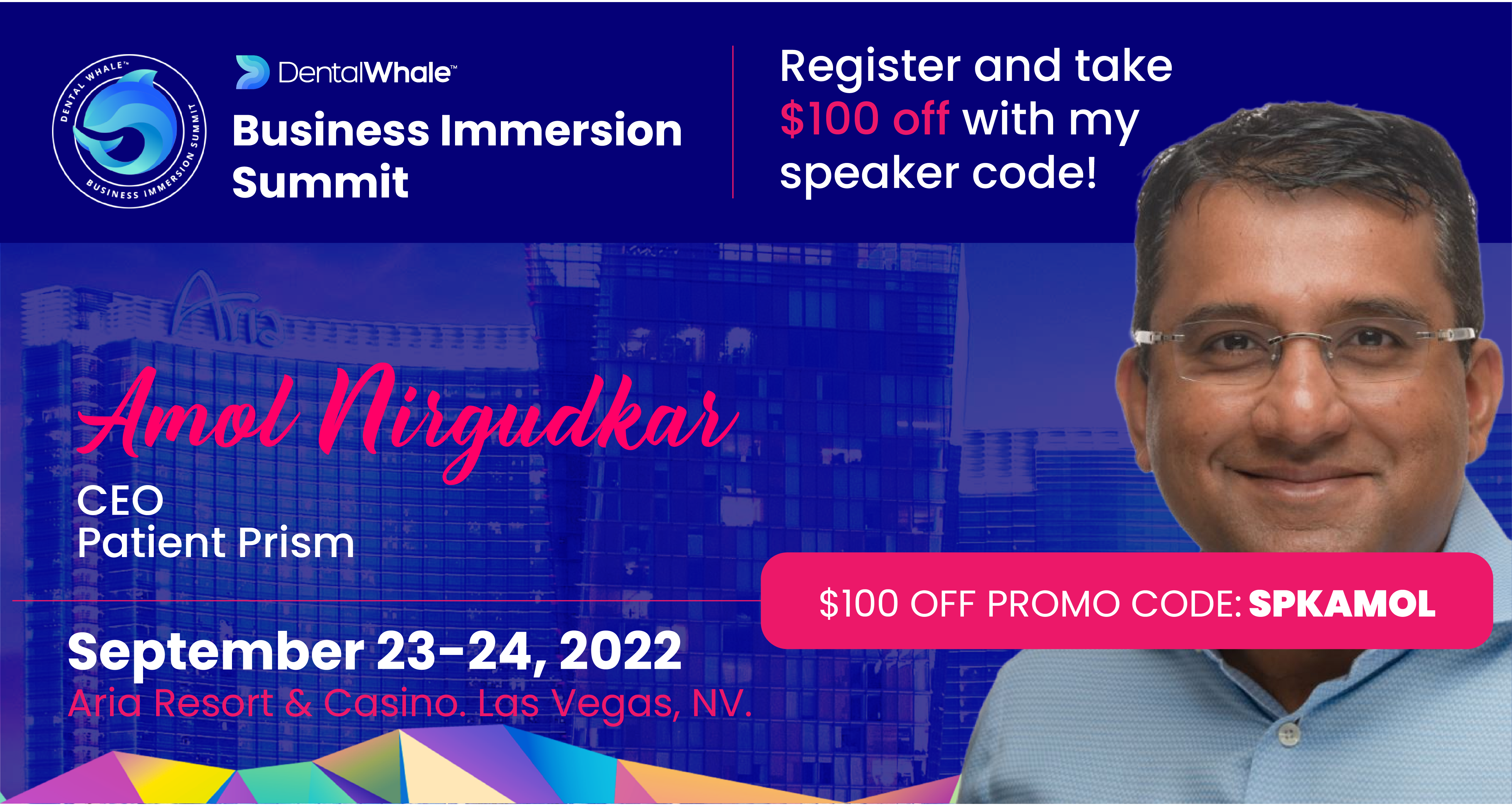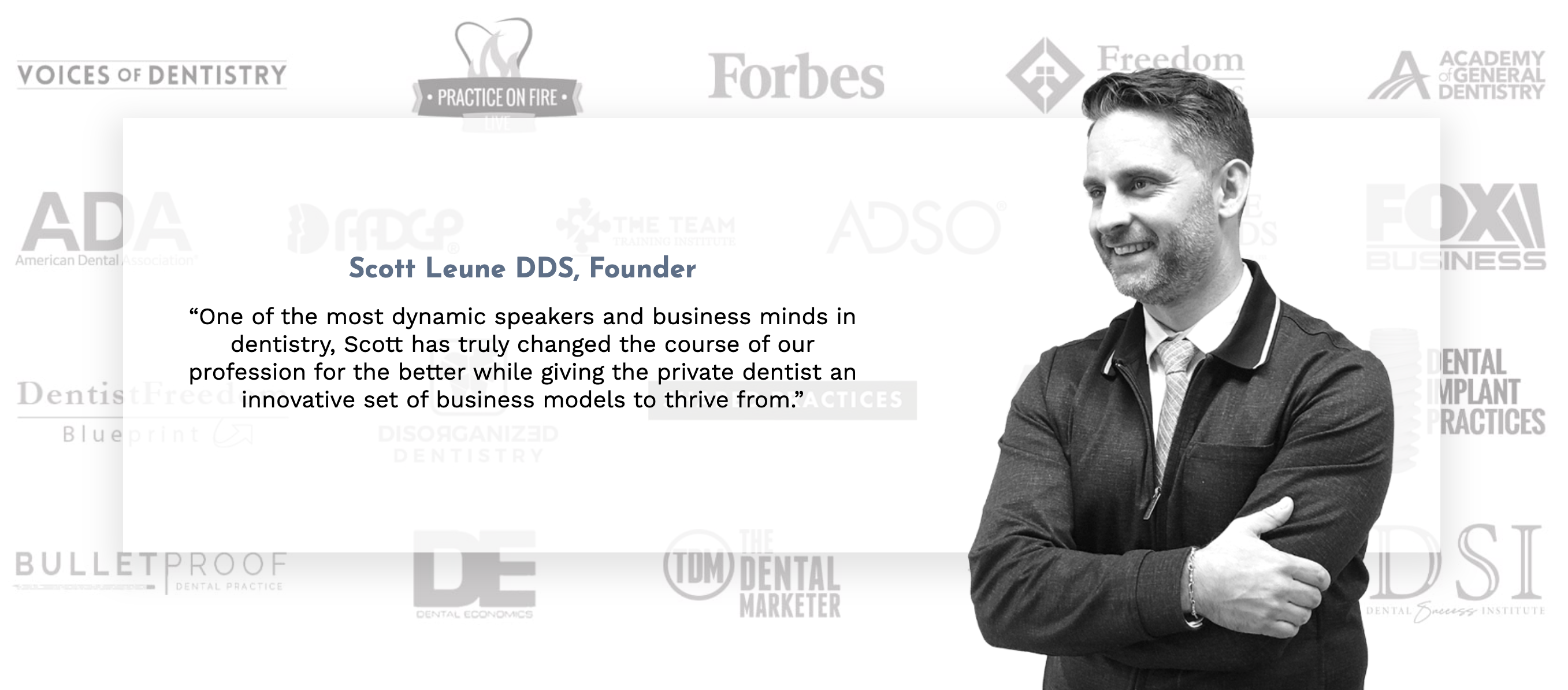August 2022--Dr. Scott Leune, CEO of Breakaway Practice, co-founder of Dental Whale, and dental industry key opinion leader, made a stop in Patient Prism’s live studio at the 2022 Dykema Definitive DSO Conference in Denver. Amid a very busy day, he and Patient Prism’s CEO, Amol Nirgudkar, unpacked two major conversations occurring at the conference.
“A lot of the DSO industry is now composed of emerging groups that are growing fast, and as they keep growing, they are facing significant roadblocks,” says Nirgudkar. “They need to set up an infrastructure. They need to set up call centers. They must set up procurement processes. They must figure out how to scale marketing. All these things are not easy to set up, and they've got to invest, and they’ve got to train. What solutions do you think are out there?”
“We've seen the billion-dollar DSOs form the jumbo DSOs. But, also forming are service companies that build and provide DSO infrastructure. They've been building to huge sizes, as well,” says Leune.
 Dental Whale is one of those companies. Dental Whale provides marketing, scheduling, dental equipment, equipment repair, and team training. The Dental Whale Practice Group has partnering doctors in San Antonio, Texas, and in Miami and Sunrise, Florida. Dr. Leune’s Breakaway Seminar events are helping dentists across the country.
Dental Whale is one of those companies. Dental Whale provides marketing, scheduling, dental equipment, equipment repair, and team training. The Dental Whale Practice Group has partnering doctors in San Antonio, Texas, and in Miami and Sunrise, Florida. Dr. Leune’s Breakaway Seminar events are helping dentists across the country.
Many companies provide services to emerging DSOs
“If I am an emerging DSO today, I do not want to risk a lot of my capital on building a call center, billing, insurance, marketing, and IT,” says Leune. “Things like that are very costly. Today, we can rent the call center we want to build. We can rent the revenue cycle management, the marketing, and the IT support. And when I say rent, it is renting it from a company that has built those things to the size of a jumbo DSO."
Leune continues, “I wouldn't want to build my own call center today as an emerging DSO, I would want to have the high quality and low cost of a large call center that has already been built to support DSOs.”
Like Dental Whale, Patient Prism is a part of that service ecosystem. In the case of Patient Prism, it is providing AI experience and data that would not be cost-effective for a single DSO to develop. In addition, the training of an AI bot for dentistry takes years.
Dental Whale has built world-class support services and is able to rent them to DSOs so they can benefit from economies of scale and pay as they grow. “Even if you decide to do your own call center or marketing in the future, you can take that piece out of the services when you are ready,” says Nirgudkar.
“Yes,” says Leune. “If, for example, an emerging DSO with 30 or 40 locations joins our buying group, they have supply prices as though they have 2,000 locations. They could have call center support as though they have 2,000 locations. If at some point they want their own call center, they will have learned from using ours.”
The challenge of staffing in 2022
“Dental practices should spend most of their time with their patients, and not a lot of time with insurance companies or doing things that take away from the patient experience,” says Nirgudkar.
“And let’s add that it's not easy to find staff today, so outsourcing recruiting and hiring to a DSO infrastructure helps dentists,” remarks Leune.
“Our Patient Prism clients' offices are booked 60 to 90 days out. New patients don’t want to wait for appointments,” says Nirgudkar. “How do you solve that, provided the shortage of dentists and hygienists?”
“You either expand your capacity to see those patients sooner, or you cut the patient demand down by dropping insurance plans,” says Leune. “One of those two choices enables you to become more profitable. Most want to expand their patient base, not cut it. So, they're looking to expand capacity.”
Another way to accommodate more patients who call is to open an additional practice. “We have practices that are too booked out. And that, to us, is an insurance policy on the next startup we build, not too far away,” says Leune. “There are a lot of different knobs to turn. And unfortunately, a lot of us are so trapped in our own way of doing something, that that's all we see. We forget there are some other things outside the box.”
Leune continues, “How do you expand capacity, especially in a time when it's difficult to find staff? First, you go to things like assisted hygiene and expanded hours. And now, you're not having to find as many hygienists. They need to be assisted, but to have them assisted, you need to pay differently. In an area where you used to pay hygienists $35 or $40 an hour, now you're paying $50 or $55 an hour. We focus heavily on innovating how they're trained. Everyone else seems to be trying to figure out how to not pay so much. In our dental group, we pay more than the market because the hygienists are producing $2,500 a day. It’s easy to retain and find new hygienists and expand capacity because we're paying more than most people.”
Leune advocates a hygiene model that supports case acceptance
“How much time do you alot for each hygiene patient?” asks Nirgudkar.
“In our case, we’re scheduling 90 minutes per patient. The hygienist spends 50 minutes, and the dental assistant spends 40 minutes,” says Leune. "The primary responsibility of hygienists is to support the doctor in case acceptance. And there is a choreographed play that happens with every new patient. We have them do what we've termed a pre-diagnosis to introduce certain problems to a patient using images. We use artificial intelligence software in front of a patient, as a case acceptance tool. We have internal cameras that help us find decay, as a case acceptance tool. There's a place for scripting in certain situations."
Leune continues, “All of that turns a hygienist into one of the primary educators. And the result of that is that it takes the doctor way less time to diagnose and explain treatment. You have some doctors who say, ‘I can't cover more hygiene ops,’ but that's in part because their exams have too many steps in them. If we can give some of those steps to the hygienist, the doctor can cover more columns, and then their schedule is full.”
Leune continues, “Overall, we can cover more hygiene ops per day, which means we can expand hygiene without feeling the need to add more dentists.”
“It's interesting,” says Nirgudkar. “Pat Bauer said this morning that we should treat our hygienists as providers. They're not just technicians, cleaning teeth and doing SRPs. We should treat them as providers and allow them to co-diagnose with the doctor. Is that important?”
“Incredibly important,” says Leune. “In an ideal world, the doctor is the last one to tell a patient what the patient needs. They're the final stop. If they're the first one, the patient has not built trust ahead of that diagnosis,” says Leune.
“Here's the other thing,” he says. “Most dentists are trying to look for another hygienist. I'm trying to look for a very inexperienced, low-level assistant who is going to be my hygiene assistant to add another column of hygiene. And that's so much easier to find. And now, what does my hygienist do? My hygienist does what they are built to do, which is co-diagnose, educate, and scale. Everything else can be done by another job title that's much easier to fill at a lower cost. And the hygienist is okay with that if I've aligned their pay properly with the extra patients they're going to see.”
The Breakaway Seminar
Dr. Leune trains a thousand dentists and CEOs a year through his Breakaway Seminar. “We have four specific events. Each is two days long with 400 pages of content. It's like drinking from a fire hose for 16 hours. And that's what we do,” says Leune. “That is my passion. I enjoy talking about what we know. And we know a lot because we also have our own DSO. And we have 20,000 dental practices connected to our Dental Whale services.
“We've also chosen to measure things other people haven't measured yet. And we've asked questions people haven't asked yet. We’ve learned from making mistakes, and it's my passion to teach what we’ve learned.”
“It is such a pleasure and honor to talk to you,” says Nirgudkar. “I'm excited to be part of Dental Whale’s Business Immersion Summit that's coming up in September.”

Subscribe to our blog for the latest updates
By submitting this form you will be receiving our latest updates on post. We're committed to your privacy. Patient Prism uses the information you provide to us to contact you about our relevant content, products, and services. You may unsubscribe from these communications at any time.
- Recent
- Popular










.svg) Share
Share.svg) Tweet
Tweet.svg) Post
Post.svg) Mail
Mail




